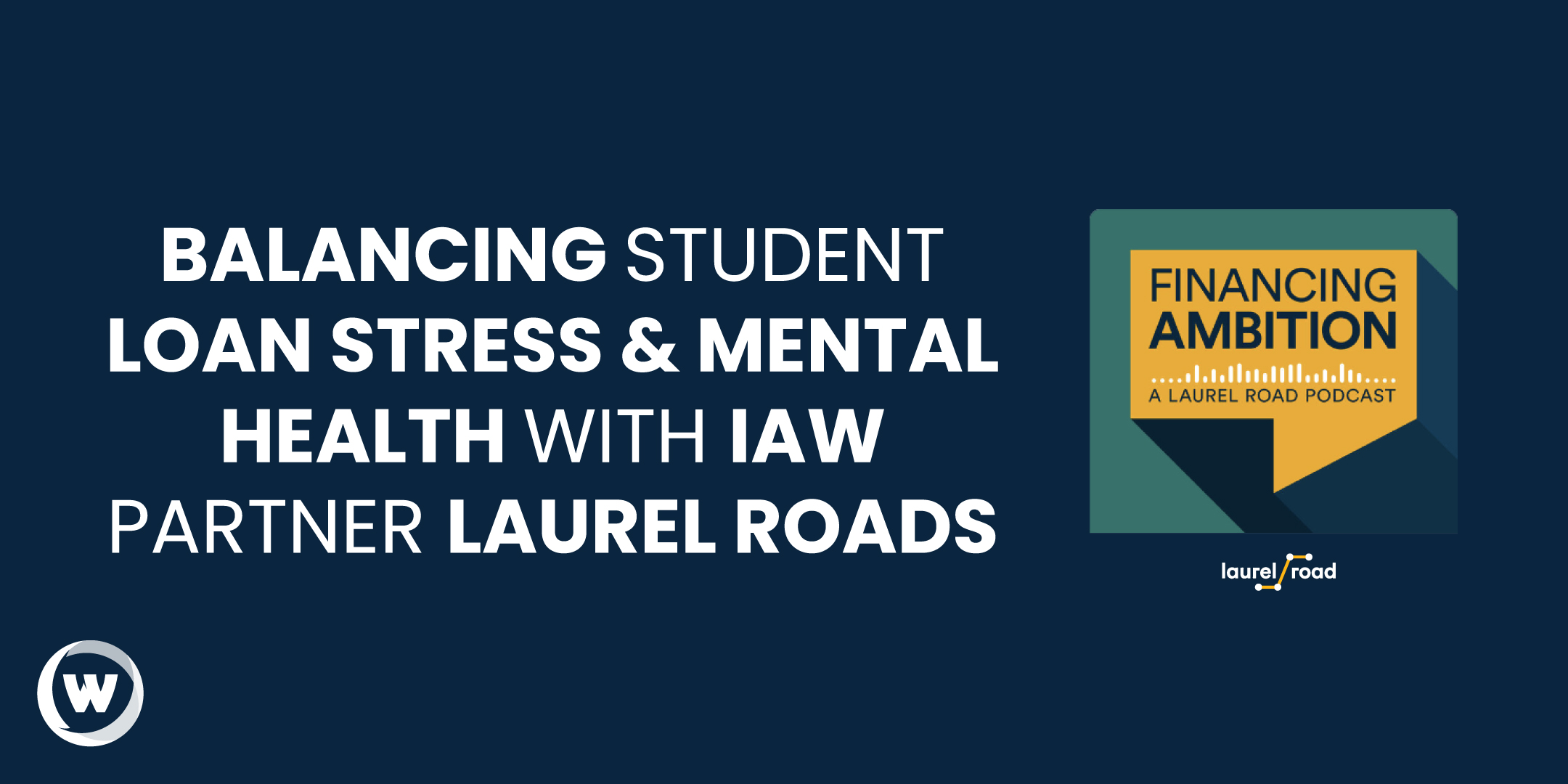For many, the path forward with student loan debt is uncertain with the recent court order block on the Biden-Harris Student Debt plan. There are 42.8 million Americans with student loans and their average debt balance is $37,787. And nearly 72% of Americans under 40 say that managing their finances is a strain on their mental health.
Financial wellness is vital to maintain as we navigate these obstacles. It’s important to remember that while debt can feel isolating, you are not alone in your journey to financial stability. Companies, like IAW Partner Laurel Road, are there to help individuals find educational resources, expert advice, refinancing options, and more.
In one of the recent podcast episodes of Financing Ambition, Eric Stutton, host and Head of Design at Laurel Roads, invited financial therapist and licensed mental health counselor Aja Evans to share her expertise on balancing mental health with financial strains. She has over a decade of experience helping individuals with their relationship with money, economic anxiety, work stress, and self-esteem.
Here are a few tips from Aja, Eric, and Kaitlin Walsh-Epstein, CMO at Laurel Roads, shared in the podcast:
1. Take a pause
Billing statements, bank accounts, and financial lingo can become overwhelming quickly. The last thing you want to do is make a silly mistake while you’re juggling everything. “When we make snap decisions about our finances, it usually only results in temporary relief. It makes us feel better in the moment, but it’s not a long-term solution” said Aja. Before you begin, set everything aside for a few minutes and take a breather.
Try these nine ways to find mindfulness during times of stress.
2. Be specific and realistic about your goals
Eliminating all your student debt is a large goal to pursue. IAW offers resources to help women make SMART goals that allow them to achieve large dreams through smaller actions. SMART goals focus your desires to be as specific as possible and help you find achievable actions that set your plan in motion. This way you chop down that debt bit by bit.
3. What did you do last time?
Aja observed that financial stress is not a new experience for many individuals. She suggests you reflect on the last time it occurred and what steps did you take that helped. Consider what worked and didn’t, whose advice you used, and what are some things you want to learn more about? Aja recommends writing them down so you can return when you’re feeling stressed.
4. Communicate with those around you
A Laurel Roads poll found that 65% of participants felt that talking to others about their financial situation helped. Your friends and family will remind you that you’re not alone in facing your problems. Plus, chances are they’ve been through something similar and can offer advice or resources they used in the past. Their emotional support will be invaluable to you.
Professional communities like IAW are also a valuable resource to rely on in times of financial stress. Thousands of women across the globe connect through IAW and find mentors, sponsors, clients, and more that support their professional or business goals. Learn more about the benefits of IAW here.
5. Talk to an expert
If you’re looking to get expert insight, then consider consulting with a financial advisor or student loan counselor. They use their years of experience and know-how on all things student loans to show you all the options and resources available. Plus, they can guide you along the way as policies continue to change to reassess what are your next steps.
6. Consider refinancing
For those who don’t qualify for federal student loan forgiveness, refinancing your loans with lenders like Laurel Roads could lower the interest rate or shorten the loan term. “It’s important to note that when you refinance your loan, the lender is paying off your original loan and issuing you a new loan based on the updated terms you qualified for,” explained Kaitlin. “This new loan is then considered a private student loan, so federal student loan holders would be forfeiting any benefits that they could qualify for under federal programs, including, again, but not limited to forgiveness and income-driven repayment.”
Losing federal program benefits could mean a major advantage in how you repay your loans. If you are interested in learning more about federal vs. private loans, read all about it on Laurel Road’s website here.
7. Revisit your plans
Federal policies, the economy, and your life naturally change over time. It’s important to remain calm and proactive throughout your financial planning. Think of it as a guide you follow to balance your lifestyle, financial needs, and goals. “I think it’s important for people to realize that plans can change. This is not making a plan and never changing it. It’s make a plan, and as life shifts, your plan can shift with it,” said Aja.




